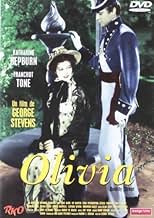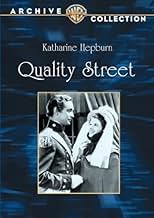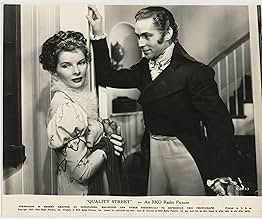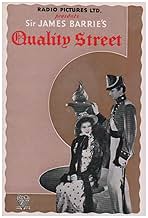NOTE IMDb
6,2/10
1,4 k
MA NOTE
Ajouter une intrigue dans votre langueIn the 1810s, an old maid poses as her own niece in order to teach her onetime beau a lesson.In the 1810s, an old maid poses as her own niece in order to teach her onetime beau a lesson.In the 1810s, an old maid poses as her own niece in order to teach her onetime beau a lesson.
- Réalisation
- Scénario
- Casting principal
- Nommé pour 1 Oscar
- 3 victoires et 1 nomination au total
Sherwood Bailey
- William Smith
- (non crédité)
William Bakewell
- Lt. Spicer
- (non crédité)
Joan Fontaine
- Charlotte Parratt
- (non crédité)
Helena Grant
- Fanny Willoughby
- (non crédité)
Bonita Granville
- Isabella
- (non crédité)
Carmencita Johnson
- Student
- (non crédité)
Payne B. Johnson
- School Boy
- (non crédité)
Darwood Kaye
- Student
- (non crédité)
Florence Lake
- Henrietta Turnbull
- (non crédité)
Helen Lynn
- Girl
- (non crédité)
Lydia McKim
- Schoolgirl
- (non crédité)
Clifford Severn
- Arthur, a Student
- (non crédité)
Avis à la une
Quality Street is a contrived romance, with a small cast, on a set that looks like a play stage, with few visual impacts and in B&W. So, why did we enjoy it so much? The cast, down to the overplayed smaller parts, all does a great job. The ensemble cast brings spirit to even the small parts, the dialogue is clever, and the asides and glances make it fun. We particularly enjoyed the set and period behaviors as great insights on life in the early 19th century. Hollywood did a great job in establishing this period essence through effective use of hints and props. If you like Hepburn, you will enjoy this moral story, with feminine strength in an unforgiving society. Worth a relook!
"Quality Street" from 1937 stars Katharine Hepburn, Franchot Tone, Fay Bainter, and Estelle Winwood. It's directed by George Stevens, who directed Hepburn later in Woman of the Year.
Hepburn plays Phoebe Throssel, a lovely young woman living with her spinster sister (Bainter) and surrounded by other spinsters who are neighbors in 1800. Phoebe is in love with one man, Valentine Brown -- as is pointed out in the film, other men have come calling, but Phoebe didn't want them.
Valentine, however, is off to the Napoleonic Wars. When he returns ten years later, Phoebe and her sister have opened a school in their home. Phoebe is embarrassed at being so exhausted and believes she has lost her looks. Nevertheless, Valentine wants her to attend the homecoming ball.
Phoebe, trying to prove something to herself, puts on a fancy dress and does her hair differently. When Valentine arrives, she introduces herself as Olivia ("Livvie"), Phoebe's niece. She gives him Phoebe's regrets, but she doesn't feel well. The two attend the ball together, where Livvy is surrounded by men. She believes that she now has a chance of Valentine proposing to Livvy. If only she can stay away from people who can expose her.
James Barrie wrote many plays that were performed by some of theater's biggest stars at the beginning of this century so it's no wonder Hollywood made it as a movie. It still retains many of its play-like qualities.
The character actors -- Bainter, Winwood, Eric Blore, are wonderful. Tone is very handsome though he doesn't have much to do. Though some might disagree, I felt Hepburn was somewhat miscast. Her portrayal of Phoebe/Livvie, though energetic, feels "put on" rather than organic. She was a tremendously strong actress but pulls back here - it doesn't seem natural.
The cast must have had a great deal of patience - Stevens, known as a very nice man, was known for having actors do 40 takes of one scene; it's one reason why Montgomery Clift never worked for him again after A Place in the Sun. He just didn't have the patience for it.
This is a charming, light film that looks stagy, but that shouldn't hurt your enjoyment of it.
Hepburn plays Phoebe Throssel, a lovely young woman living with her spinster sister (Bainter) and surrounded by other spinsters who are neighbors in 1800. Phoebe is in love with one man, Valentine Brown -- as is pointed out in the film, other men have come calling, but Phoebe didn't want them.
Valentine, however, is off to the Napoleonic Wars. When he returns ten years later, Phoebe and her sister have opened a school in their home. Phoebe is embarrassed at being so exhausted and believes she has lost her looks. Nevertheless, Valentine wants her to attend the homecoming ball.
Phoebe, trying to prove something to herself, puts on a fancy dress and does her hair differently. When Valentine arrives, she introduces herself as Olivia ("Livvie"), Phoebe's niece. She gives him Phoebe's regrets, but she doesn't feel well. The two attend the ball together, where Livvy is surrounded by men. She believes that she now has a chance of Valentine proposing to Livvy. If only she can stay away from people who can expose her.
James Barrie wrote many plays that were performed by some of theater's biggest stars at the beginning of this century so it's no wonder Hollywood made it as a movie. It still retains many of its play-like qualities.
The character actors -- Bainter, Winwood, Eric Blore, are wonderful. Tone is very handsome though he doesn't have much to do. Though some might disagree, I felt Hepburn was somewhat miscast. Her portrayal of Phoebe/Livvie, though energetic, feels "put on" rather than organic. She was a tremendously strong actress but pulls back here - it doesn't seem natural.
The cast must have had a great deal of patience - Stevens, known as a very nice man, was known for having actors do 40 takes of one scene; it's one reason why Montgomery Clift never worked for him again after A Place in the Sun. He just didn't have the patience for it.
This is a charming, light film that looks stagy, but that shouldn't hurt your enjoyment of it.
...Well, this film is chock full of boisterous shyness! Look at us we are so shy! And it gets very annoying in short order. It's about a street in England in 1805 - Quality Street - that has nobody but spinsters living there. No explanation of this is ever given. Every time a man appears all of the curtains part, and the residents all stare. In fact, anytime somebody new appears on the street they all stare.
The residents we are introduced to are ridiculously introverted and repressed, yet they are also passive aggressive and spend their time being nosey about others since they have no real lives of their own. The Throssel sisters are two people living on this street, young Phoebe (Kate Hepburn) and her older sister, Susan (Fay Bainter). Phoebe has some hope of being taken away from all of this when she meets a young physician, Valentine Brown (Franchot Tone), who seems interested in her, but when he comes to her house for a big announcement, it is that he has joined the army to fight Napoleon.
Phoebe declares that Brown is the one she loves, she is not interested in entertaining any other suitors, and then she throws herself into the work of running a school with her sister. Ten years pass and although Phoebe is only 30, she looks much older than that. Thus when Val (Valentine) returns from war, he is visibly shaken by her changed and wilted appearance and seems to recoil. After he leaves, Phoebe shakes down her hair, puts on an ornate gown, and begins to prance around as though she is 20 again. In the process, she seems to transform back into her 20 year old self. It's rather ridiculous - kind of like the 60s movie where a secretary takes off her glasses, shakes down her hair and is suddenly a go-go dancer, but I digress.
The problem is that Val returns suddenly and sees her like this and Phoebe is embarrassed by her behavior, so a servant identifies her as Livy, Phoebe's niece. Val is entranced, and now Phoebe is forced to keep up the ruse of being two people. The complicating factor is that the existence of this relative that nobody ever knew existed is noticed by the nosey neighbors, they don't believe that Livy is a real person, and they set out to prove that Livy and Phoebe are one in the same. Complications ensue.
Besides belaboring the issue of the residents of Quality Street being repressed but nosey, there are just no real likeable characters here. Phoebe should have cleared up this matter from the start but she doesn't, and Val is clueless as to what he means to Phoebe and seems to forget what time and age do to people. It does get pretty amusing in the last act, but it's a tough hard slog to get to that last act.
The residents we are introduced to are ridiculously introverted and repressed, yet they are also passive aggressive and spend their time being nosey about others since they have no real lives of their own. The Throssel sisters are two people living on this street, young Phoebe (Kate Hepburn) and her older sister, Susan (Fay Bainter). Phoebe has some hope of being taken away from all of this when she meets a young physician, Valentine Brown (Franchot Tone), who seems interested in her, but when he comes to her house for a big announcement, it is that he has joined the army to fight Napoleon.
Phoebe declares that Brown is the one she loves, she is not interested in entertaining any other suitors, and then she throws herself into the work of running a school with her sister. Ten years pass and although Phoebe is only 30, she looks much older than that. Thus when Val (Valentine) returns from war, he is visibly shaken by her changed and wilted appearance and seems to recoil. After he leaves, Phoebe shakes down her hair, puts on an ornate gown, and begins to prance around as though she is 20 again. In the process, she seems to transform back into her 20 year old self. It's rather ridiculous - kind of like the 60s movie where a secretary takes off her glasses, shakes down her hair and is suddenly a go-go dancer, but I digress.
The problem is that Val returns suddenly and sees her like this and Phoebe is embarrassed by her behavior, so a servant identifies her as Livy, Phoebe's niece. Val is entranced, and now Phoebe is forced to keep up the ruse of being two people. The complicating factor is that the existence of this relative that nobody ever knew existed is noticed by the nosey neighbors, they don't believe that Livy is a real person, and they set out to prove that Livy and Phoebe are one in the same. Complications ensue.
Besides belaboring the issue of the residents of Quality Street being repressed but nosey, there are just no real likeable characters here. Phoebe should have cleared up this matter from the start but she doesn't, and Val is clueless as to what he means to Phoebe and seems to forget what time and age do to people. It does get pretty amusing in the last act, but it's a tough hard slog to get to that last act.
Delightful comedy of errors. Pheobe (Hepburn) is in love with the dashing Dr. Brown, but alas her love is unrequited. They meet again 10 years later on his return from the Napoleonic Wars. She has wilted under the strain of teaching little children and is self-conscious about her age. On a whim she decides to dress in her former radiant style, and ends up being mistaken by Dr. Brown for Pheobe's niece. They start to court, and from there it's all silly and predictable, but... sparkling dialogue, great acting and wonderful supporting parts (especially the nosy old spinsters at the windows)
The original play was set in the early 1800s during the time of the Napoleonic Wars. This is a very cute, funny comedy if you understand that it describes a time when a woman's future was defined by her looks, youth, fertility, and chastity. With the destruction of monastic life in England, the only future for a woman at the time of the play was marriage.
The witty cast and script made the film a lot of fun. Seem to recall reading that the Hollywood actresses of that era wanted to be in this movie, and I can see why - it was a hoot. Especially Eric Blore, who always turned in a good performance.
Western culture at the time of the play valued fertility in marriage highly, and men tended to want wives who were rounder than Miss Hepburn. Other than that, her performance was wonderful as always.
The witty cast and script made the film a lot of fun. Seem to recall reading that the Hollywood actresses of that era wanted to be in this movie, and I can see why - it was a hoot. Especially Eric Blore, who always turned in a good performance.
Western culture at the time of the play valued fertility in marriage highly, and men tended to want wives who were rounder than Miss Hepburn. Other than that, her performance was wonderful as always.
Le saviez-vous
- AnecdotesThe Nestle produced chocolates "Quality Street" were named after J. M Barrie's play by their original manufacturer Mackintosh in 1936.
- GaffesWhen Phoebe and Susan are talking about Mr. B., Phoebe is on a chair and Susan is sitting on a sofa a certain distance near a bonnet. But on the following cuts, Susan's sitting position keeps changing so that she is gets closer and closer to the bonnet.
- Citations
Mary Willoughby: [Goes to the window and looks out] It's that impertinent recruiting sergeant. I passed him on the street yesterday. He closed one of his eyes at me, then quickly opened it again.
[She demonstrates to the other ladies in the room]
Mary Willoughby: I knew what he meant.
[She looks out again and sees the recruiting officer wink at her. She quickly closes the window curtain]
- Crédits fousOpening card:
1805 England Quality Street Where a gentleman passerby is an event.
- ConnexionsFeatured in George Stevens: A Filmmaker's Journey (1984)
Meilleurs choix
Connectez-vous pour évaluer et suivre la liste de favoris afin de recevoir des recommandations personnalisées
- How long is Quality Street?Alimenté par Alexa
Détails
- Durée
- 1h 23min(83 min)
- Couleur
- Rapport de forme
- 1.37 : 1
Contribuer à cette page
Suggérer une modification ou ajouter du contenu manquant

































